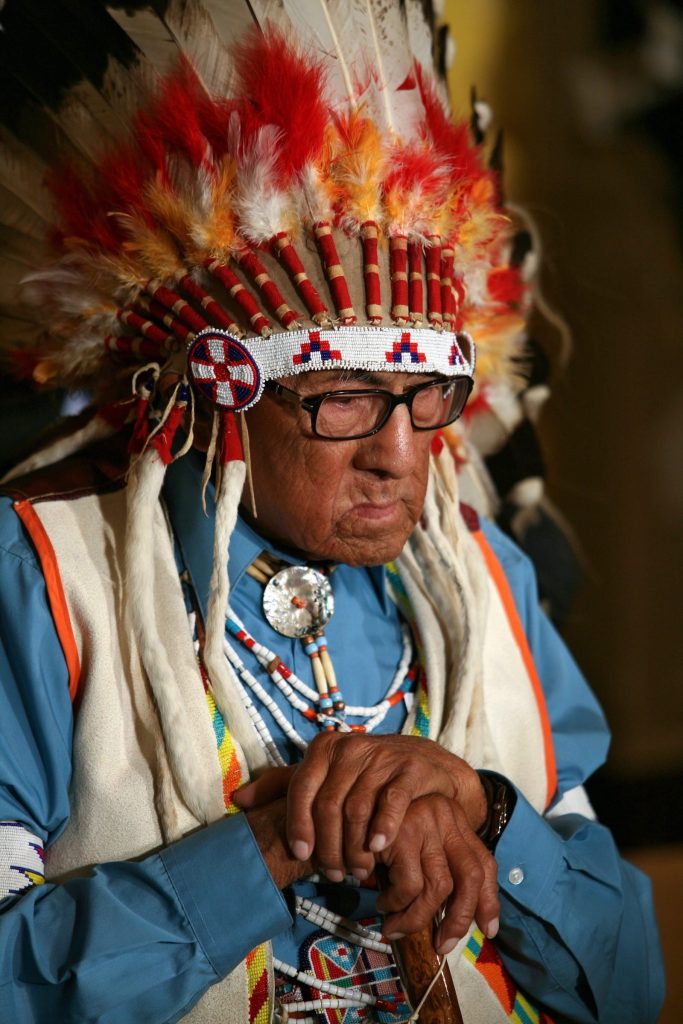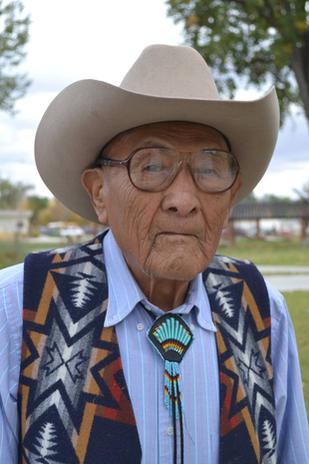A prominent Kicked In The Belly chief, war leader, and reservation-era chief, Joseph “Joe” Medicine Crow was a Crow Elder, the last surviving war chief of the Crow tribe, tribal historian, and the first of his tribe to become a university educated anthropologist. Medicine Crow died Sunday, April 3, 2016 at the age of 102 at a hospice house in Billings, Montana. A half-sister, Louella Whiteman Runs Him Johnson, confirmed his death and said she did not know the cause.
 A member of the Crow Tribe’s Whistling Water clan, Medicine Crow was raised by his grandparents in a log house in a rural area of the Crow Reservation near Lodge Grass, Montana.
A member of the Crow Tribe’s Whistling Water clan, Medicine Crow was raised by his grandparents in a log house in a rural area of the Crow Reservation near Lodge Grass, Montana.
His Crow name was High Bird, (PédhitšhÎ-wahpášh), and he was also known as Raven, (Peelatchiwaaxpáash), and he recalled listening as a child to stories about the Battle of Little Bighorn from those who were there, including his grandmother’s brother, White Man Runs Him, a scout for Lt. Col. George Armstrong Custer.
His grandfather, Yellowtail, raised Medicine Crow to be a warrior. The training began when Medicine Crow was just 6 or 7, with a punishing physical regimen that included running barefoot in the snow to toughen the boy’s feet and spirit.
Medicine Crow in 1939 became the first of his tribe to receive a master’s degree, in anthropology. He served as the official Crow Historian for half his life, cataloging his people’s nomadic history by collecting firsthand accounts of pre-reservation life from fellow tribal members.
 “I always told people, when you meet Joe Medicine Crow, you’re shaking hands with the 19th century,” said Herman Viola, curator emeritus at the Smithsonian Institution’s National Museum of American Indians.
“I always told people, when you meet Joe Medicine Crow, you’re shaking hands with the 19th century,” said Herman Viola, curator emeritus at the Smithsonian Institution’s National Museum of American Indians.
During World War II, Medicine Crow earned the title of war chief after performing a series of daring deeds, including stealing horses from an enemy camp and hand-to-hand combat with a German soldier whose life Medicine Crow ultimately spared. He was the recipient of the Bronze Star Medal, and the Légion d’honneur.
“Warfare was our highest art, but Plains Indian warfare was not about killing. It was about intelligence, leadership, and honor,” Medicine Crow wrote in his 2006 book “Counting Coup: Becoming a Crow Chief on the Reservation and Beyond.“
In all, he wrote almost a dozen books including Crow Migration Story, Medicine Crow, the Handbook of Crow Indian Laws and Treaties , Crow Indian Buffalo Jump Techniques, and From the Heart of the Crow Country: The Crow Indians’ Own Stories
. He also authored a children’s book entitled Brave Wolf and the Thunderbird: Tales of the People
. His book Counting Coup, written about his life, was chosen by the National Council for the Social Studies as a “Notable Tradebook for Young People” in 2007.
Soon after returning from the European front, Medicine Crow was designated the official tribal historian by the Crow Tribal Council, a title he held for over 60 years.
With his prodigious memory, Medicine Crow could accurately recall decades later the names, dates and exploits from the oral history he was exposed to as a child, Viola said. Those included tales told by four of the six Crow scouts who were at Custer’s side at Little Bighorn and who Medicine Crow knew personally.
Yet Medicine Crow also embraced the changes that came with the settling of the West, and he worked to bridge his people’s cultural traditions with the opportunities of modern society. His voice became familiar to many outside the region as the narrator for American Indian exhibits in major museums across the country. He wrote the play and provided the narration for the Annual Battle of the Little Big Horn Reenactment held in Hardin, Montana near the Crow Reservation each year. Even after his hearing and eyesight faded, Medicine Crow continued to lecture into his late 90s on the Battle of Little Bighorn and other major events in Crow history.
 In the years leading to his death, Medicine Crow continued to live with his family in Lodge Grass. His wife of more than 60 years died in 2009.
In the years leading to his death, Medicine Crow continued to live with his family in Lodge Grass. His wife of more than 60 years died in 2009.
joseph-medicine-crow-military-medals.jpg”He really wanted to walk in both worlds, the white world and Indian world, and he knew education was a key to success,” said Viola, who first met Medicine Crow in 1972 and collaborated with him on several books.
Gov. Steve Bullock said Medicine Crow was an inspiration to his tribe and others.
“Joe was a Crow war chief, veteran, elder, historian, author, and educator. His legacy will forever serve as an inspiration for all Native Americans — and all Montanans,” he said.
U.S. Sen. Steve Daines said Medicine Crow was a good leader and the first member of the Crow Tribe to attain a master’s degree.
“Medicine Crow’s spirit, humility and life achievements leave a lasting imprint on Montana’s history,” Daines said.
President Barack Obama awarded Medicine Crow the Presidential Medal of Freedom in 2009. The award recognized him as “a warrior and living legend” whose military service, educational achievement and dedication to cultural preservation made him a “symbol of strength and survival.” During the White House ceremony, Obama referred to Medicine Crow as “a good man, a ‘bacheitche‘ in Crow. His life reflects not only the warrior spirit of the Crow people, but America’s highest ideals,” Obama said.
He was nominated for the Congressional Gold Medal and was awarded honorary doctoral degrees from the University of Southern California and Montana’s Rocky Mountain College.
Joseph Medicine Crow was also made a Knight in the French Legion of Honor.

